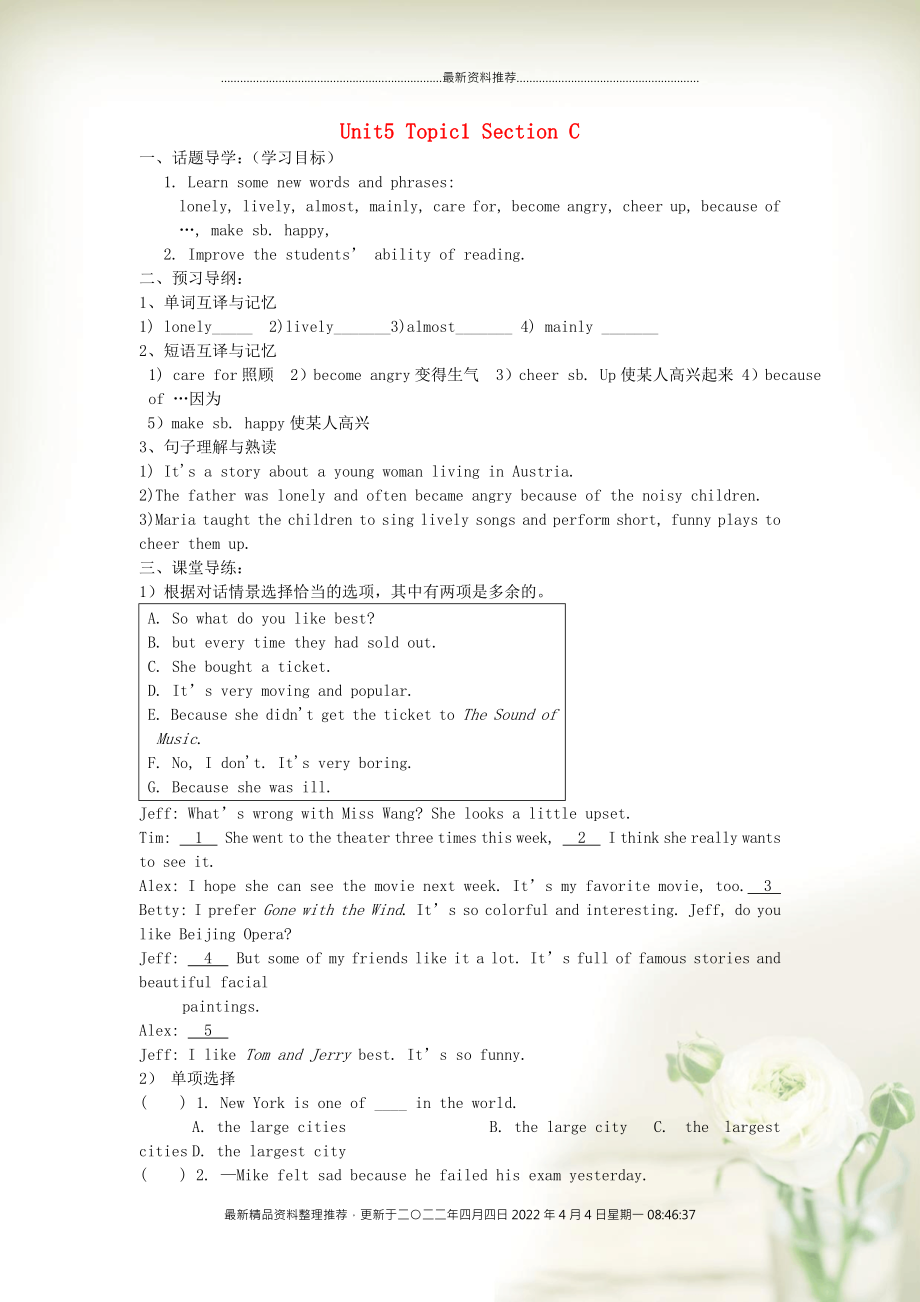《(新新導(dǎo)學(xué)案)廣東省清遠(yuǎn)市八年級(jí)英語(yǔ)下冊(cè) Unit 5 Feeling Excited Topic 1 I’m so happy SectionC導(dǎo)學(xué)案 (新版)仁愛版》由會(huì)員分享�����,可在線閱讀�����,更多相關(guān)《(新新導(dǎo)學(xué)案)廣東省清遠(yuǎn)市八年級(jí)英語(yǔ)下冊(cè) Unit 5 Feeling Excited Topic 1 I’m so happy SectionC導(dǎo)學(xué)案 (新版)仁愛版(3頁(yè)珍藏版)》請(qǐng)?jiān)谘b配圖網(wǎng)上搜索�����。
1�、……………………………………………………………最新資料推薦…………………………………………………
Unit5 Topic1 Section C
一���、話題導(dǎo)學(xué):(學(xué)習(xí)目標(biāo))
1. Learn some new words and phrases:
lonely, lively, almost, mainly, care for, become angry, cheer up, because of …, make sb. happy,
2. Improve the students’ ability of reading.
二��、預(yù)習(xí)導(dǎo)綱:
1����、單詞互譯與記憶
1) lonel
2、y_____ 2)lively_______3)almost_______ 4) mainly _______
2�����、短語(yǔ)互譯與記憶
1) care for照顧 2)become angry變得生氣 3)cheer sb. Up使某人高興起來(lái) 4)because of …因?yàn)?
5)make sb. happy使某人高興
3�����、句子理解與熟讀
1) It's a story about a young woman living in Austria.
2)The father was lonely and often became angry because of the noi
3�����、sy children.
3)Maria taught the children to sing lively songs and perform short, funny plays to cheer them up.
三�����、課堂導(dǎo)練:
1)根據(jù)對(duì)話情景選擇恰當(dāng)?shù)倪x項(xiàng)��,其中有兩項(xiàng)是多余的���。
A. So what do you like best?
B. but every time they had sold out.
C. She bought a ticket.
D. It’s very moving and popular.
E. Because she didn'
4�、t get the ticket to The Sound of Music.
F. No, I don't. It's very boring.
G. Because she was ill.
Jeff: What’s wrong with Miss Wang? She looks a little upset.
Tim: 1 She went to the theater three times this week, 2 I think she really wants to see it.
Alex: I hope she can see the mov
5�����、ie next week. It’s my favorite movie, too. 3
Betty: I prefer Gone with the Wind. It’s so colorful and interesting. Jeff, do you like Beijing Opera?
Jeff: 4 But some of my friends like it a lot. It’s full of famous stories and beautiful facial
paintings.
Alex: 5
Jeff: I like Tom and
6、 Jerry best. It’s so funny.
2) 單項(xiàng)選擇
( ) 1. New York is one of ____ in the world.
A. the large cities B. the large city C. the largest cities D. the largest city
( ) 2. —Mike felt sad because he failed his exam yesterday.
—I’m sorry to hear that. Let’s ____.
A. cheer him on B. chee
7�、r on him C. cheer him up D. cheer up him
( ) 3. Some children were skating on the ice happily. Suddenly one of them ____ the water and the other children felt ____.
A. falls into; frightening B. fell into; frightened C. fall into; frightening D. fall into; frightened
( ) 4. The little
8、girl felt upset ____ her pet dog died.
A. why B. because of C. because D. what
( ) 5. I didn’t do my homework . My father is _________ with it.
A. angry B. pleased C. satisfied D. worried
四�、復(fù)習(xí)自測(cè):
Everyone needs friends. We all like to 1 close to someone. It is nice
9、to have a friend to talk, laugh and do things with. 2 , sometimes we need to be alone. We don’t always want people 3 . But we would feel lonely if we never had a friend.
No two people are 4 . Friends sometimes don’t get on well. That doesn’t mean 5
they no longer like each other. Mos
10�、t of the time they will make up(言歸于好),and become 6
again.
Sometimes friends move away. Then we feel very 7 . We miss them very much, but we can 8_ them and write to them. It could be possible that we could even see them again. And we can also 9 new friends.
There’s more good news
11�����、 for people who have friends. They live longer than people who don’t have. Why? It could be that they are 10 . Being happy helps you stay well and it could be good just knowing that someone cares about you.
( ) 1. A. look B. watch C. feel D. see
( ) 2. A. Hardly B. Nearly C. Suddenly D. C
12���、ertainly
( ) 3. A. alone B. away C. all over D. around
( ) 4. A. friendly B. kind C. just the same D. quite different
( ) 5. A. that B. whether C. how D. why
( ) 6. A. enemies B. strangers C. students D. friends
( ) 7. A. angry B. sad C. happy D. alone
( ) 8. A. call B. ask C
13、. tell D. talk with
( ) 9. A. look for B. find C. make D. know
( ) 10. A. happier B. stronger C. kinder D. richer
五���、課文解讀:
1)The father was lonely and often became angry because of the noisy children.
父親很孤獨(dú)�,而且常常因?yàn)楹⒆犹[而生氣���。
lonely 單獨(dú)的�、孤獨(dú)的���、偏僻的�,形容詞,可在系動(dòng)詞后作表語(yǔ)和修飾名詞作定語(yǔ)���;alone 獨(dú)自一人的�����,形容詞(作表語(yǔ))
14�����、或副詞(作狀語(yǔ))
because 接原因狀語(yǔ)從句��;because of sb./sth./doing sth.
例:Because playing football makes him strong and it’s popular all over the world.
因?yàn)樘咦闱蚴顾眢w健康�,而且這項(xiàng)運(yùn)動(dòng)在全世界都很流行�。
I felt happy because of seeing the film.因?yàn)榭戳诉@場(chǎng)電影,我很高興�����。
2)Maria taught the children to sing lively songs and perform sh
15�����、ort, funny plays to cheer them up.
為了讓孩子們高興起來(lái)����,瑪利亞教他們唱?dú)g樂(lè)活潑的歌曲并表演有趣的話劇�。
teach sb.+學(xué)科Miss Ye teaches us English.
teach sb. to do…教某人干某事�; teach oneself…自學(xué)…
六、評(píng)價(jià)
內(nèi)容
等級(jí)
自評(píng)
小組長(zhǎng)評(píng)價(jià)
預(yù)習(xí)情況
A
B
C
D
課堂表現(xiàn)
A
B
C
D
小組合作
A
B
C
D
Section C
二�����、1���、1)孤獨(dú)的�、寂寞的 2)充滿趣味的 3)幾乎4) 主要的
三��、1) 1-5 EBDFA
2)1-5 CABBD
四��、1---5CDDCA 6---10 DBACA
最新精品資料整理推薦��,更新于二〇二二年四月四日2022年4月4日星期一08:46:37
 (新新導(dǎo)學(xué)案)廣東省清遠(yuǎn)市八年級(jí)英語(yǔ)下冊(cè) Unit 5 Feeling Excited Topic 1 I’m so happy SectionC導(dǎo)學(xué)案 (新版)仁愛版
(新新導(dǎo)學(xué)案)廣東省清遠(yuǎn)市八年級(jí)英語(yǔ)下冊(cè) Unit 5 Feeling Excited Topic 1 I’m so happy SectionC導(dǎo)學(xué)案 (新版)仁愛版

